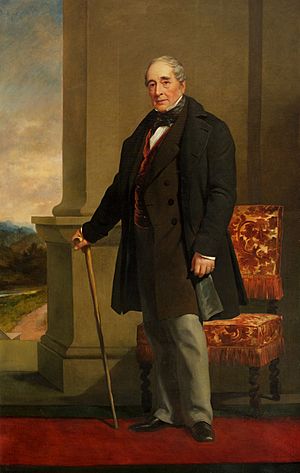Thomas Frankland Lewis facts for kids
Sir Thomas Frankland Lewis (born May 14, 1780 – died January 22, 1855) was an important figure in British politics. He was a Member of Parliament, often called an MP, and also worked as a Poor Law Commissioner. He helped make big changes to how the poor were supported in Britain.
Contents
Early Life and Education
Thomas Frankland Lewis was born in London on May 14, 1780. His father was John Lewis, who was also an MP. His mother was Anne Frankland.
He went to a famous school called Eton College. After that, he studied at Christ Church, Oxford, which is part of Oxford University. However, he did not finish his degree there.
Becoming a Parliament Member
Thomas Lewis managed his family's lands in Radnorshire, a county in Wales. He worked to make these lands better. In 1804, he became the High Sheriff of Radnorshire, a local official.
He really wanted to be involved in national politics. In 1812, he became a Member of Parliament for the area of Beaumaris. This was his first step into national government.
Lewis's Time as an MP
Lewis served as an MP for many years between 1812 and 1855. He represented different areas, including Ennis from 1826 to 1828, Radnorshire from 1828 to 1834, and Radnor Boroughs from 1847 to 1855.
He was known for supporting landowners and farmers. He also believed in Catholic emancipation, which meant giving more rights to Catholics. In 1820, he was chosen to be a Fellow of the Royal Society, a group that promotes science.
Work as a Commissioner
Thomas Lewis became well-known for his work on special government groups called commissions. These groups investigated important issues and suggested changes.
Poor Law Commission Leader
From 1834 to 1839, Lewis was the chairman of the Poor Law Commission. This commission was set up to change the laws about how poor people were helped. He worked with other commissioners like George Nicholls. They often had different ideas from Edwin Chadwick, who had pushed for these reforms.
Other Important Commissions
Lewis also led a commission that looked into the Rebecca Riots. These were protests in Wales where people dressed as women attacked tollgates. He then chaired another commission that led to the end of turnpike trusts. These trusts used to collect money from people using certain roads.
For all his important work, Thomas Lewis was given a special honor in 1846. He was made a baronet, which meant he could use the title "Sir."
Family Life
Sir Thomas Frankland Lewis married Harriet Cornewall. She was the daughter of Sir George Cornewall.
They had two sons:
- George Cornewall Lewis (born 1806 – died 1863)
- Gilbert Frankland Lewis (born 1808 – died 1883)
 | Isaac Myers |
 | D. Hamilton Jackson |
 | A. Philip Randolph |


